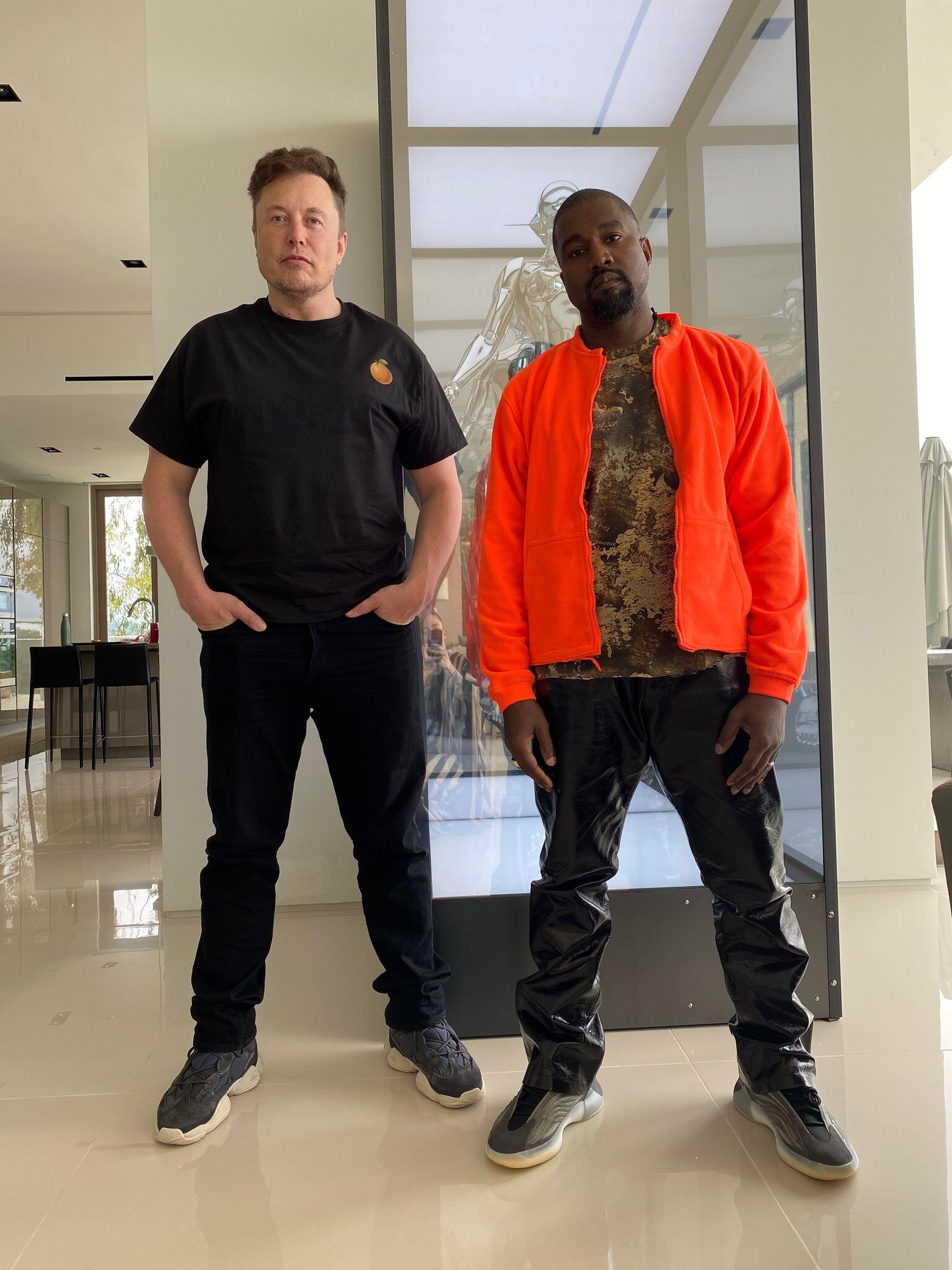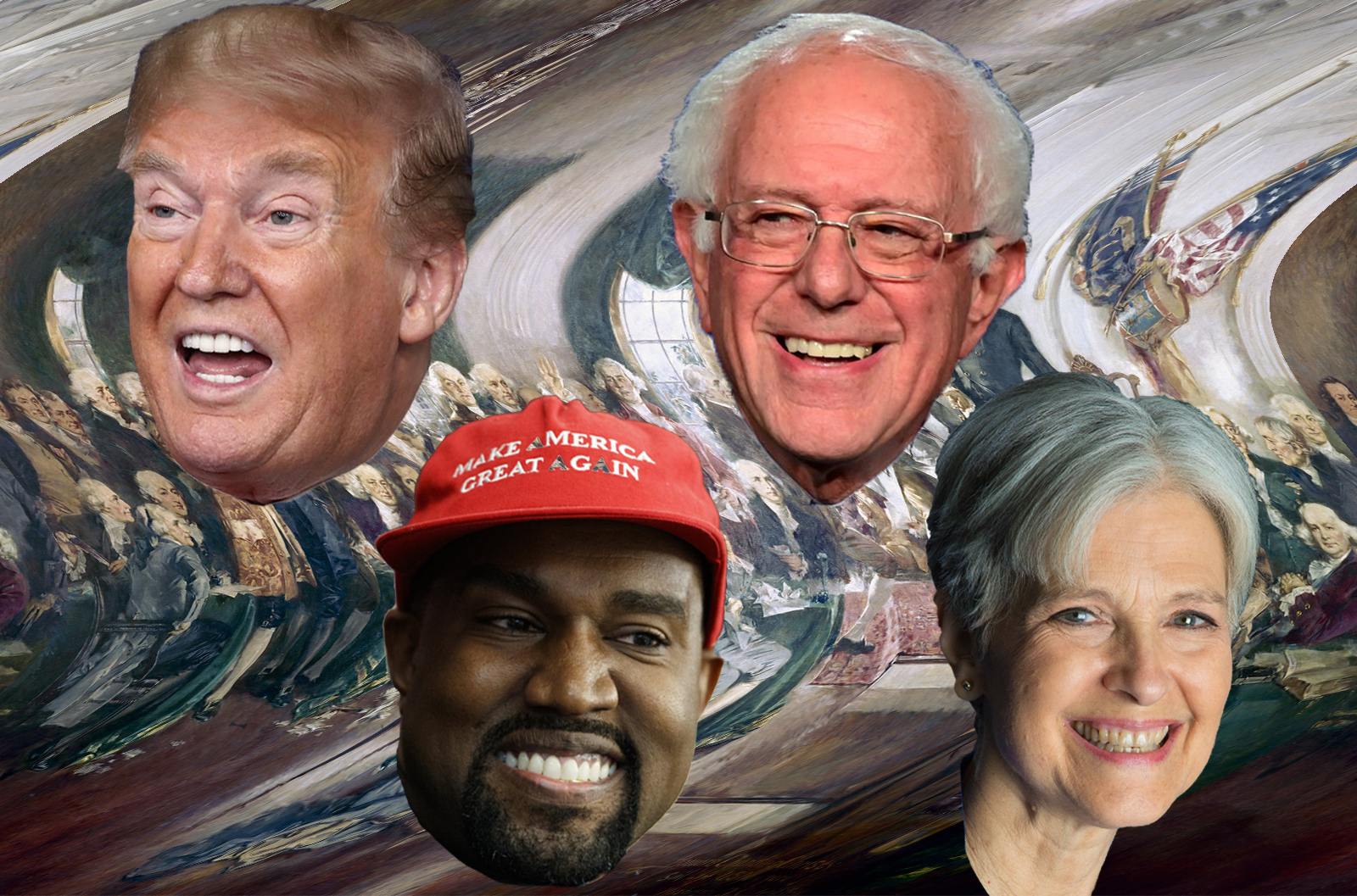As you are likely to have already heard: Kanye West is running for President of the United States. 120 days before the general election, the country was greeted with another surprise as the 27 word notice was tweeted out last weekend. Even on Fourth of July, the announcement sent countless media outlets and pundits into a ferver; not to mentioned the untold number of social media accounts that weighed into West’s decision. What they unknowingly highlight is inconvenient democracy at work.
To be clear from the start, Kanye West is not running for president. Which is to say that, at least for this election, Kanye & his raging Id are not a serious factor in the race for the White House. As many outlets have pointed out, the West “campaign” has missed several crucial ballot deadlines. On top of that, Kanye’s ambition has yet to be supported by a campaign staff or a fundraising apparatus.
Just by the weight of his celebrity, Kanye will surely gain votes from the electorate. However, any support he secures at the ballot will be trivial in the overall scheme of the 2020 presidential election. The question naturally arises, then, why has this story become so huge in the midst of an already plot-heavy year? Why has a candidacy that will obviously not effect the outcome of the upcoming presidential election amass so much interest?
It is not unusual for presidential announcements to garner tremendous amounts of media fanfare. Content-hungry platforms are always willing to devout an hour or a half dozen articles to any politician who throws their hat in the ring. But the reaction to Kanye’s tweet was markedly different; in fact, it bordered on apoplexy. After his tweet, stories relating to his proclamation went trending on CNN.com and other mid-tier news aggregator and outlets. Even supposedly prestigious mastheads like The Wall Street Journal and The Associated Press ran stories that treated the aforementioned tweet as if it were the resignation of Richard Nixon.
However, the most passionate reactions came from Twitter. According to Forbes, the announcement was the highest-trending topic in the US for nearly 20 hours. Many accounts on the site judged the ploy to simply be a way to get attention. Kanye West recently signed a deal with apparel retailer Gap, and it is expected he will release a new album in the near future.

While there was a sizeable portion of users who rightly dismissed Kanye’s ambitions as, at best fantastical, or, at worst, a shameless publicity stunt—there was a significantly-sized cohort who deemed Kanye’s statement to be an outright assault on their view of electoral politics and democracy.
It did not take much to find scores of tweets proclaiming that Kanye was attempting to somehow spoil the election by running a would-be independent presidential campaign. Many, if not all, of these posts went further, however. Many insinuated, if not outright declared, that a Kanye West candidacy would “steal votes away from Joe Biden and help President Trump get reelected,” or a variation thereof. Though widely subscribed to, this is a degenerative outlook on democracy.
In the US, we like to think that our fellow citizens understand democracy and endorses its merits. We envision ourselves of defenders of democracy and enablers of anyone who wants to participate in that process. Yet with Kanye’s presidential proclamation, I am reminded that these are lies we tell ourselves. Kanye West is the most recent example of an American participating in the wrong type of democracy.
When you understand why so many are angry at Kanye West you find widespread degenerative views on democracy.
Normally, a democratic election consists of a contest where votes are exchanged for representation. Anybody who has a vision for how their jurisdictions should be run, and thinks he/she can enact positive change, is encouraged to deliver themselves to the electorate for scrutiny. Ideally, the best members of our society will take that challenge and run for political office. If voters like said person’s platforms, promises, and/or past, they will vote for them. If not, they choose to vote for someone else or no one at all. A candidate might win, or they might lose, but what matters is that – with little restrictions – they are afforded the chance to earn the votes from neighbors near and far.
Equally true, however, is that a well-functioning and authentic representative democracy grants potentially odious or unserious individuals the ability to run for office. This is the part that the previously mentioned twitter tribe willfully ignores or erroneously disputes.
This type of regressive view of democracy sets two negative motions. First, that candidates, by virtue of some arbitrary affiliation, are owed votes from certain constituents; and, secondly, that voting for someone outside the two traditional political parties somehow helps one candidate over the other. Allow me to briefly rebut these bad-faith views on democracy.
It should go without saying, but nevertheless: In a democracy, no candidate is owed a vote. Just because a candidate belongs to a powerful political party or is thought to have some shared political outlook, he/she is not entitled to anyone’s vote. Votes (and the underlying support they are made off of) are earned, not granted. To suggest that Kanye – or anyone else, for that matter – would “split” the vote and “take votes away” from Biden/Trump is foolish, civically backwards, and condescending.
While it is true that a vote can figuratively be cast against another candidate in favor of their competitor, in reality there’s no such thing as a negative vote. Elections are decided by whichever candidate wins the most votes, not by who takes more votes away from their opponent(s).
And it must be mentioned how much more patronizing this tripe is when it is told to marginalized and historically-disenfranchised citizens like Black Americans and women.
I am becoming increasingly convinced that people only care about democracy in so far as it serves their own interest.
As alluded to before, Kanye is not the first political actor to bear the brunt of unegalitarian electoral antagonism. We need only go back five years to discover similar smears. Back in 2015, the target was “long-shot” Bernie Sanders. His crime was akin to Kanye’s in that he dared to buck party “unity” for a run at the Democratic nomination. Even worse, he challenged the all-but-coronated Queen of Neoliberalism, Hillary Clinton. You can take the things said about Kanye today and find analogous attacks that were levied against Sanders – despite Sanders being one of the most popular and influential politicians in America today.
The same undemocratic blackening was directed later in the 2016 general election when third-party nominees Dr. Jill Stein and Gary Johnson came under attack. Again, slanderous aspersions that certain candidates are “splitting the vote” or stealing votes from one of two established candidates were hurled at Stein and Johnson just as they are at Kanye. They were wrong then as much as they are wrong now.
Just to be clear: It’s fine to disagree with Kanye or Jill Stein or any other candidates’ politics and policies. Those types of attacks are fair game and should even be encouraged. However, if you claim to believe in a government in which everyone has the opportunity to effect change by running for office, and yet you decry Kanye’s presidential aspirations, you are an unprincipled gatekeeper.
You cannot simultaneously extol the virtues of democracy while shaming candidates who run against your personal interest. Or, even worse, wins against your interest. This may be in inconvenient reality of democracy, but it is a important feature nevertheless. If this feature is erased, that is, if we adopt a discriminatory gate for joining political contests, the egalitarian potency of democracy will be severely nullified.
The significance of the 2020 presidential election is not lost on me. I understand that there are people who believe that if Donald Trump is re-elected, the United States will not survive. I also recognize that there is another faction that believes that if Joe Biden wins, America will collapse on itself. However, the antidote to these alleged dilemmas is not to shame voters or gatekeep candidates. In furtherance of our shared desire to maintain a democratic system, we must assume that our fellow citizens are well-intentioned actors in an inconvenient, but necessary democratic process.
